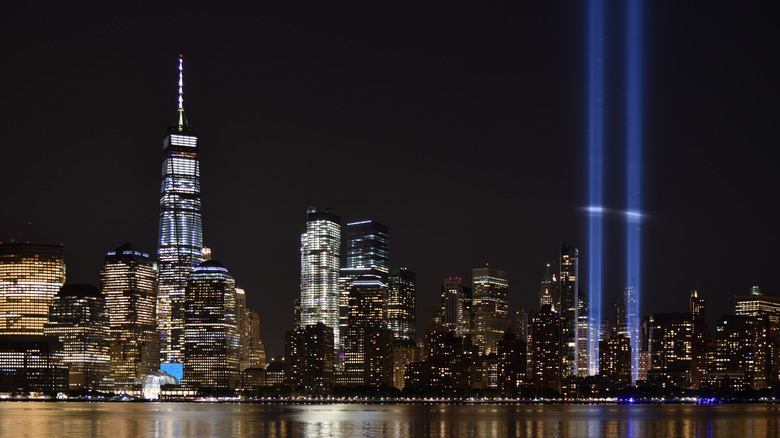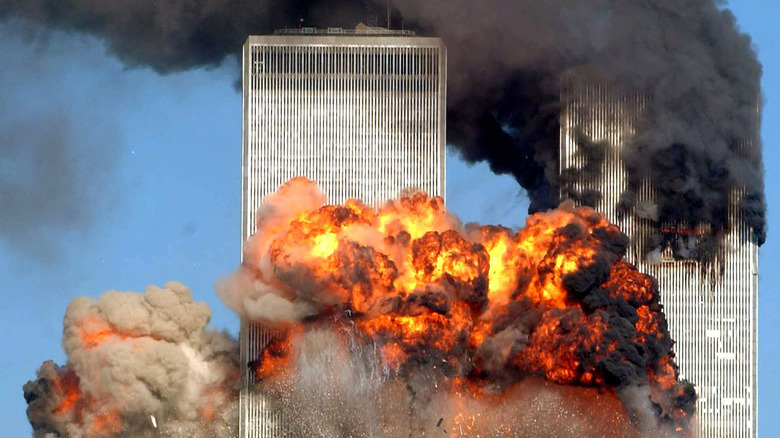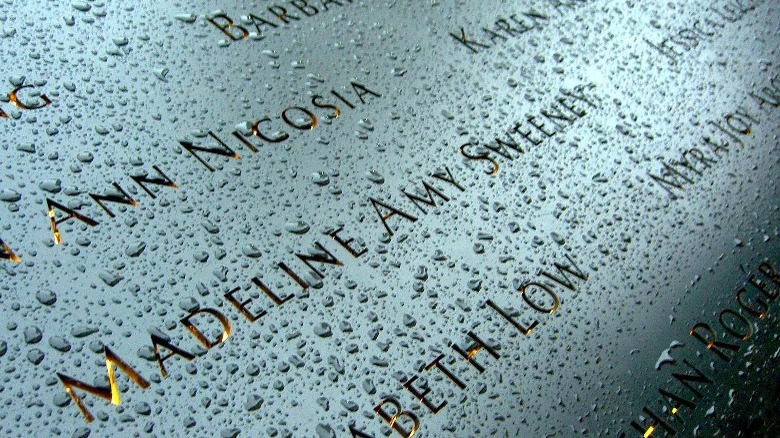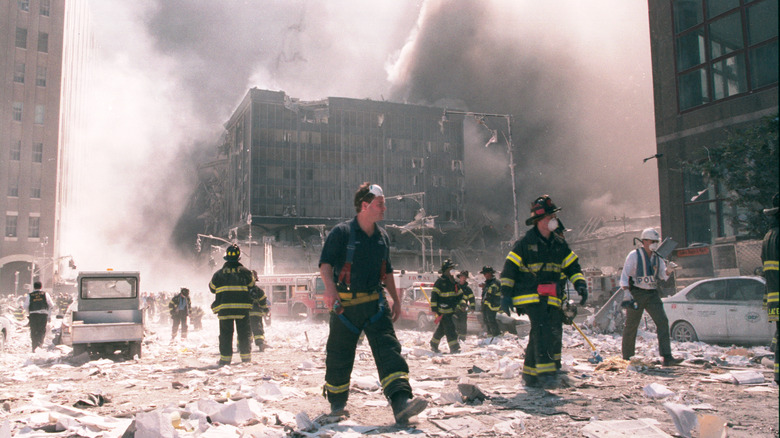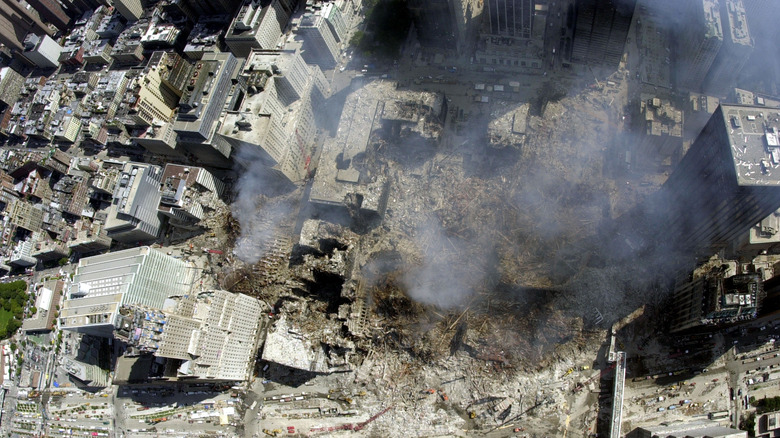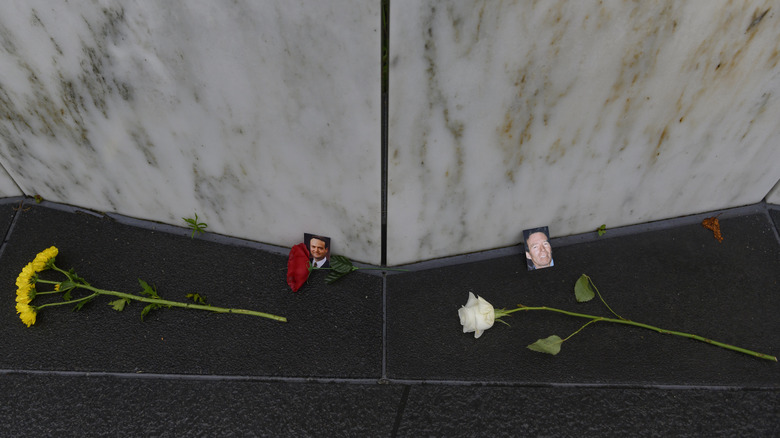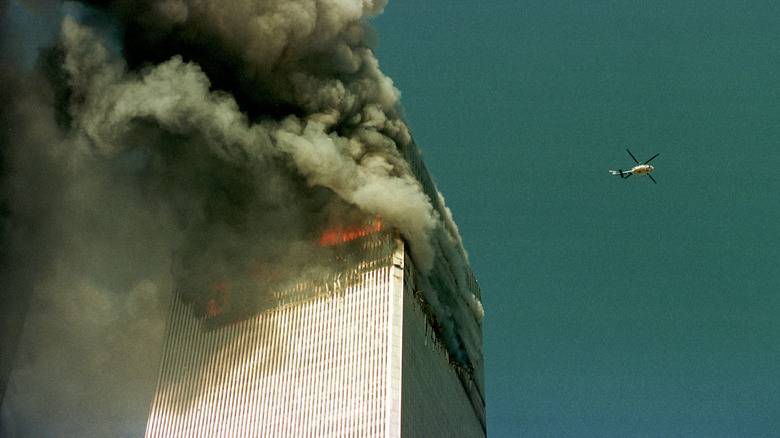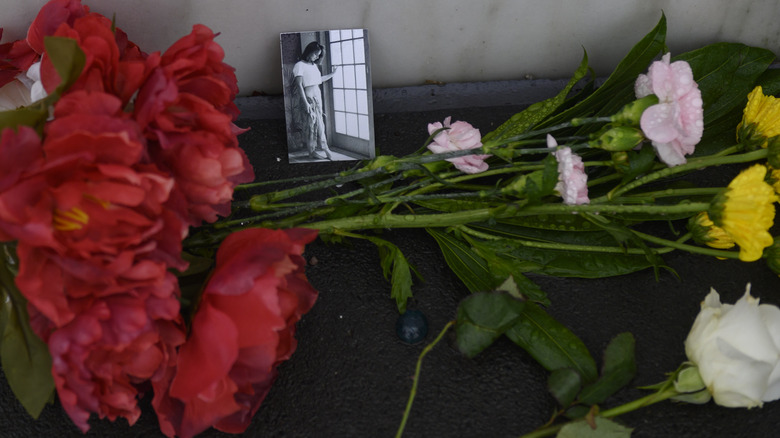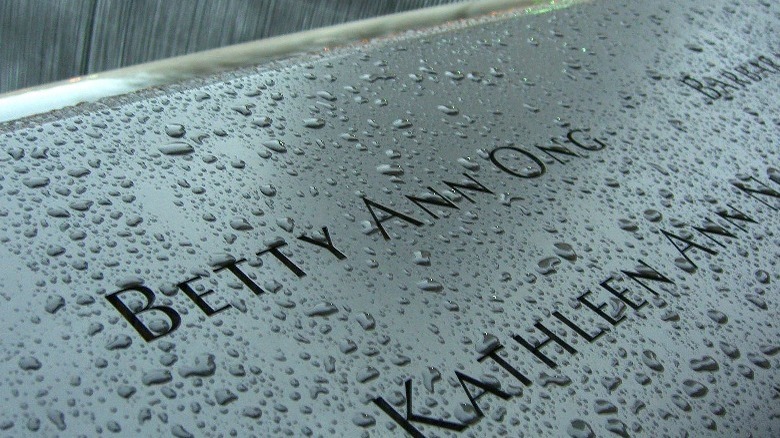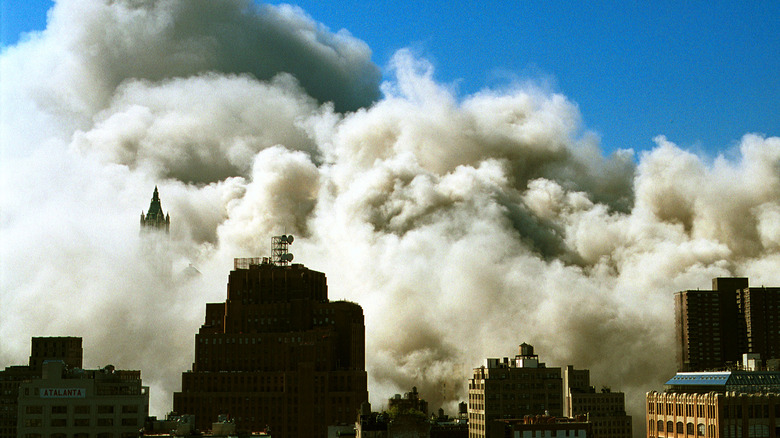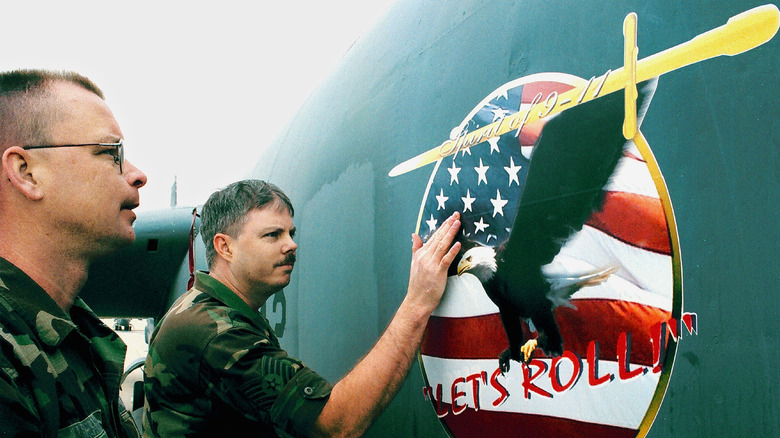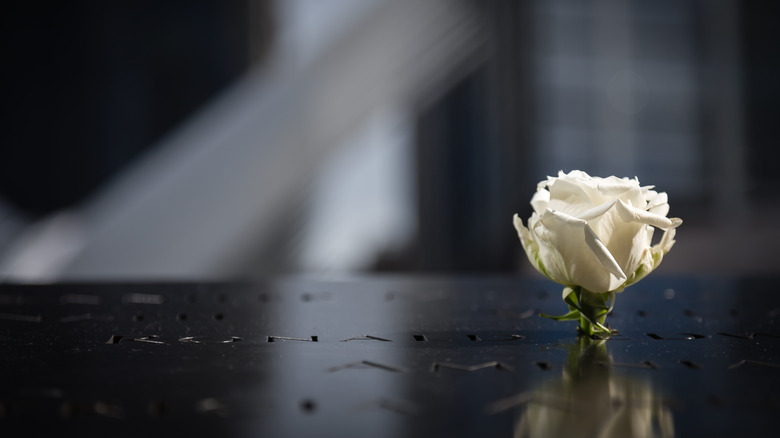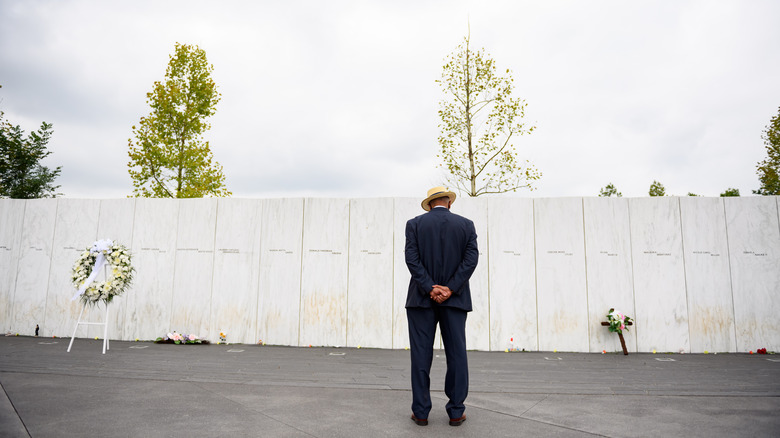Heartbreaking Last Words From 9/11 Victims
It's not an exaggeration to say that everything changed on September 11, 2001. That, of course, is the day that a shocked nation reacted to the news that a plane had hit New York City's World Trade Center, and as a horrified world watched, a second collision happened.
Shock waves rippled across the globe, but no one was hit harder than those at the epicenter. Thousands had loved ones who had gotten up on what had started out to be a perfectly ordinary day. They had gone to work, they had waited for their flights, and they had no idea that the goodbyes they said would be their last. Some reached out from the chaos to say one last farewell, but according to The New York Times, those communications were the exception, not the norm. Most? Most were simply gone.
In 2002, they interviewed 157 people for a piece documenting the 102 minutes leading up to the collapse of the Twin Towers. They found that 353 people of the thousands who worked in the building were able to make some kind of contact with those who watched and waited for news of their loved ones. Meanwhile, passengers on several other doomed flights made frantic calls to friends, family, and authorities: Their words show that clearly, many knew it would be their final words.
Final words as the tower collapsed
Beverly Eckert told the story of her last phone call with her husband, Sean Rooney, via StoryCorps. He was working in the South Tower of the World Trade Center, and when the second plane hit, he was around 20 floors above the impact zone. When he talked to her, he told her that he was on the 105th floor, and the building was quickly filling with smoke. The phone call later would be the last time they would speak.
At first, he had been documenting his attempts to escape the building. Then, she recalled: "We stopped talking about escape routes. And then we just began talking about all the happiness we shared during our lives together, I told him I wanted to be there with him, but he said, 'No, no...' He wanted me to live a full life. As the smoke got thicker, he just kept whispering, 'I love you,' over and over. ... Then I heard a sharp crack, followed by the sound of an avalanche, and it was the building beginning to collapse. I called his name into the phone, over and over."
Post-9/11, Eckert became one of the most vocal activists for the rights of victims' families, and in 2009, The New York Times reported that she had been killed in the crash of Continental Connection Flight 3407. She had been going home to Buffalo to join her family for what would have been her husband's 58th birthday.
A flight attendant's bravery
No amount of training could have prepared the flight crews of 9/11's four hijacked planes for what they were going to face that day, but according to the findings put together by the National Commission on Terrorist Attacks Upon the United States, it was the actions of several incredibly brave members of the flight crew that allowed authorities on the ground to figure out what had happened thousands of feet in the air. One of those crewmembers was Madeline Amy Sweeney, a flight attendant on American Airlines Flight 11.
She got in touch with the Boston office of the American Flight Services Offices, and then — along with her colleague — she relayed the seat numbers of the hijackers. The call was connected at 8:29, and at 8:44 — after relaying vital information to the ground and manager Michael Woodward — she said: "Something is wrong. We are in a rapid descent ... we are all over the place. We are flying low. We are flying very, very low. We are flying way too low. Oh, my God, we are way too low."
Two minutes later, the plane hit the North Tower. Twenty years later, Sweeney's then 25-year-old daughter, Anna, spoke to WCVB Boston about the importance of her last communication, saying that her mother's calmness under extraordinary pressure had made her into a hero. "Not just for me or my family, but clearly for other people as well, and that's something that I'm very proud of."
Pushed from the elevator
When Karen Hagerty's sister, Deborah Anne, had to recall the most important things about Karen for her obituary page on Legacy, they included her devotion to her animals, and her yearly toy drive benefiting the children at a homeless shelter in the Bronx.
Hagerty worked in the South Tower of the World Trade Center, and when her sister and parents were interviewed by the Tampa Bay Times in May of 2002, hers were among the remains that had not yet been identified. Her family considered the site her final resting place, and her final words were recounted by colleagues who saw her seconds before the impact of the second plane.
According to accounts gathered by The New York Times, Hagerty was among those who made it to the elevator before impact. She, however, was pushed off in the crush of people scrambling for safety, and was overheard to light-heartedly remark, "I have a horse and two cats!" She stepped back from the elevator in the seconds around the impact of the second plane, and when her colleagues came to, they caught a glimpse of her lifeless body before chaos descended.
Consoling loved ones
Brian David Sweeney was an ex-U.S. Navy pilot, and one of the passengers on the hijacked United Airlines Flight 175. After the hijacking, he was able to place a call to his wife of just two years, Julie Roth. She shared the message with the 9/11 Memorial & Museum, saying that his words gave her the strength to carry on living, because she knew that's what he would have wanted her to do.
"I'm on an airplane that's been hijacked. If things don't go well, and it's not looking good, I just want you to know I absolutely love you, I want you to do good, go have good times — same to my parents and everybody — and I just totally love you, and I'll see you when you get there. Bye, babe. I hope I call you."
Roth says that she could hear it in his voice that he knew how things were going to end, and says that his need to reach out and console her allowed her to accept the fact that continuing to honor his memory and sacrifice could come along with her own embrace of life. She went on to remarry and have two children.
Risking everything to save others
It took Tom Burnett's children 20 years before they could visit the memorial in a Pennsylvania field, marking the spot where United Airlines Flight 93 crashed after a group of passengers stood up to the hijackers in an attempt to take control of the plane. Tom was among that small group, and his wife, Deena, told MPR News: "When he told me that he was going to do something, that everything would be okay and he was coming home that night, I had no reason not to believe him."
Placing a series of four phone calls to her between 6:27 and 6:54, Tom started by telling her that the plane he was on was hijacked, and a passenger had been killed. Deena said other planes had been hijacked as well, and recalled Tom's realization that they had been caught in the midst of a suicide mission. During the third phone call, Deena believed for a moment that he had survived the Pentagon crash, and the fourth would be their final conversation.
According to a transcript of that final phone call (via the Tom Burnett Family Foundation), Tom explained, "We can't wait for the authorities. I don't know what they could do anyway. It's up to us. I think we can do it." She asked what she could do, and he responded with, "Pray, Deena, just pray." When she told him that she loved him, he answered, "Don't worry, we're going to do something," before hanging up the phone.
Two minutes to collapse
Trapped on the 92nd floor of the North Tower, Tom McGinnis called his wife, Iliana, in the final moments before the tower's collapse. She was one of the dozens of family members who spoke to The New York Times in 2002, saying that not only would the moments of that last phone call stay with her for the rest of her life, but she wanted to know precisely what had happened leading up to that catastrophic collapse.
That collapse happened at 10:28, and Tom was on the phone with Illiana at 10:18. He told her candidly how bad it was: "We're on the 92nd floor in a room we can't get out of." He gave her the names of the people he was with, and told her, "I love you. Take care of Caitlin." She was unwilling to say goodbye and unwilling to hear anything that suggested he had given up, and he explained, "You don't understand. There are people jumping from the floors above us." He repeated his love, and although she begged him not to hang up, he told her, "I got to get down on the floor."
It was the last thing he said before the call dropped, and two minutes later, the tower fell.
... and unborn child
Jack Grandcolas didn't pick up the phone when his wife called. The ringer in the bedroom was off, and it was only when he got up and turned on the television that he saw the news, and realized the world had gone terribly wrong. She had left two messages: The first, that she was opting for an earlier-than-planned flight home. The second?
"Honey, are you there? Jack? Pick up, sweetie. Okay, well I just wanted to tell you I love you. We're having a little problem on the plane. Umm. I'm totally fine. Umm. I just love you more than anything, just know that. And you know, I'm, you know, I'm not uncomfortable and I'm okay ... for now. Umm. It's just a little problem. So, I'll a ... I just love you. Please tell my family I love them too. Bye, honey."
The flight she had booked was the ill-fated Flight 93 that would crash in Pennsylvania, killing all on-board. When Jack spoked with NPR 20 years later, he said that he was still struggling daily, and still processing. It wasn't just the loss of his wife, but of their child. Lauren had been pregnant when she was killed, and alongside her name, etched into the Flight 93 National Memorial, are the words "and unborn child."
A flight attendant risking everything
It was American Airlines flight attendant Betty Ong who first made contact with authorities on the ground after the hijacking of Flight 11. In 2021, her brother Harry spoke with KTVU News, revealing that their father had always held onto hope that she would be found, alive. He held onto that hope until his death in 2007, even though Betty's remains had been recovered and laid to rest in a family cemetery plot.
Not all of Betty's conversation with the ground was recorded that day, and according to FBI transcripts, the ground crew was still scrambling to catch up with what was going on in the air when the recording cut out. The end of the conversation was recounted by a member of that ground crew with a redacted name, who said that after relaying information about the passenger who had been stabbed, "at that point she was just saying, 'Oh, my God, the flight, it's going down, it's going down." When asked to clarify if those were her last words, he added, "Basically, 'We're, we're going down.' Yea, and she did ask us to pray for her."
Two decades later, her brother still struggled with the fact that no one got to say goodbye: "It's very difficult to move forward. It's just not easy."
Business as usual... until, it wasn't
Stephen Mulderry was an equities trader who worked in the South Tower. His brother, Peter, was one of the people who spoke with The New York Times in 2002 and helped reconstruct the last moments of the victims of 9/11, and said that when they spoke, occupants of the South Tower had been assured that they were "secure," and it was oddly like business as usual: "He said, 'I got to go — the lights are ringing and the market is going to open.'"
After the second plane hit his building, Mulderry called his mother, Anne. She had been out, first at yoga and then at the post office, where she first heard about what was going on. When she got home, she told The Guardian that's when she saw there was a message left on the answering machine.
"A building went into my plane," he'd said, panicking and getting words backward. "I just want to tell you that I love you. I'll be all right and I'll call you. I love you." Even though a neighbor had made copies of the message, Anne said it took her a long time to be able to listen to it again. "I didn't want to face the fear again. There was a catch in his voice that allowed me to know that ... he knew he was facing death."
Let's roll!
The events of 9/11 might be an inarguable part of American history today, but as events unfolded, it's easy to forget that no one really had any idea just what was happening, and what the extent of the attacks was going to be. That said, it's both surprising and not surprising at all that USA Today confirms that there is no actual complete transcript of the phone call between Todd Beamer and GTE Airfone operator Lisa Jefferson.
Jefferson's official briefing is in the National Archives Catalog, and in it, she describes how Beamer's report of a hijacking set off a chain reaction that included alerting authorities like the FBI. Beamer described the hijackers, the state of things in the plane, and relayed the fact that both the pilot and copilot had been dragged from the cockpit, and lay bleeding on the floor. He relayed his own home phone number and asked that his family be contacted, and although part of the transcript is redacted, it's around there that he reported that some of the passengers were getting ready to storm the cockpit.
When someone nearby asked if he was ready, she reported that he'd responded: "Okay! Let's roll!" The phone remained connected for the next 15 minutes. By the time the call was disconnected, the plane had already crashed. In the years following 9/11, Beamer's last words were turned into everything from the title of his wife's book to a slogan for Florida State.
Pleading with her dying breath
In the years following 9/11, the families of the victims often had to struggle for information about the final moments of their loved ones. NPR says that resulted in lawsuits filed with the help of The New York Times, petitioning for the release of recordings made by emergency services. Among the calls released was Melissa Doi's, made from the 83rd floor of the South Tower.
Doi describes what's happening around her: "The floor's completely engulfed. We're on the floor and we can't breathe. ... And it's very, very hot. ... I'm going to die, aren't I? ... I'm going to die. ... Stay on the line with me, please, I feel like I'm dying. ..." Doi asks the dispatcher, "Can you find out where [the rescuers] are?" and when the dispatcher reminds her again to be calm, she simply says, "Can...?" and then, nothing.
Doi died while on the phone with the dispatcher, and according to what her cousin told the Daily Voice, she died after initially evacuating the building to the 44th floor, then being told it was safe to return to her office. Her remains were not identified for three years following the collapse of the towers.
I have to go
When Honor Elizabeth Wainio boarded Flight 93, it was for a business meeting. She worked for Discovery Channel Stores, where she'd risen through the ranks incredibly quickly. That required regular flights, as even though she had moved to New Jersey, her friends and family were still back in Maryland.
Wainio was one of the passengers who managed to make a phone call during the hijacking. She spoke to her stepmother, who recalled her final words (via the National Park Service): "They're getting ready to break into the cockpit. I have to go. I love you. Goodbye."
Twenty years after the hijacking that took the life of his daughter, Ben Wainio explained to NPR that every year when the anniversary of the attacks rolled around, it wasn't a day of remembrance for him. Instead, it felt like they were burying their daughter and saying goodbye all over again. "It gets difficult to relieve how that day ended. It's never difficult to talk about Elizabeth, because I love her and I miss her so much."
